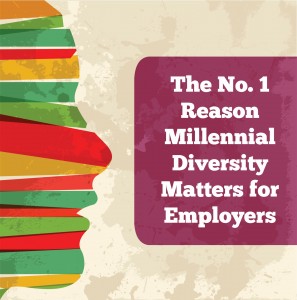 The face of the future American workforce is changing — quite literally.
The face of the future American workforce is changing — quite literally.
According to the Pew Research Center, 43 percent of Millennial adults (also known as Generation Y) are non-white, which is the highest percentage in American history. And the U.S. Census Bureau projects our country will become majority non-white as early as 2043.
But diversity among Millennials – and, of course, other generations – goes much deeper than skin color. One of my biggest observations about Millennials is the many ways in which they define themselves, ethnically, socially, regionally, professionally and otherwise.
There has even been talk of naming the generation after the Millennials – sometimes referred to as Generation Z – the “Plurals,” because they will be a fragmented, diverse cohort with few majority opinions or descriptors.
Why does all of this matter for today’s organizations that want to attract, retain and market to Generations Y and Z? Because it provides insight into the most important defining characteristic of the Millennial generation: self-definition. When you attempt to narrowly define who a Millennial is or what he or she wants, you lose that person’s interest and loyalty immediately.
Granted, I am in the business of – and at this very moment writing a blog post about – researching, writing and speaking about who Millennials are and what they want, but I attempt to always do so by showing their desire for self-definition and choice in their lives. If I’m not succeeding, please keep me honest in the comments!
3 Ways to Support Millennial Diversity
Here are some ways that employers can be conscious and respectful of Millennials’ diversity and desire to define themselves:
- Provide Millennials with opportunities to customize their work experience. You want to keep this within reason, of course, but consider giving them input on factors such as job titles, workspaces, employee benefits and technology options. Millennials don’t like to feel “just like everybody else.”
- Support employee resource groups. ERGs are social groups for people who identify with a certain gender, ethnicity, sexual orientation, interest or other commonality and they can invite Millennials to explore and express their various identities. A study by Software Advice revealed that for adults between the ages of 18 and 34, almost half (48 percent) noted they would either be “very interested” or “somewhat interested” in the prospect of joining an ERG, a percentage far higher than that for older generations.
- Be especially careful not to make assumptions about a Millennial employee’s gender, sexual orientation, personality type or even technology preferences. Common mistakes include assuming a young man has a wife or girlfriend instead of a husband or boyfriend or never meeting face-to-face with a Millennial woman on your team because you assume she’d rather text or Skype.
Of course, all of the above tips apply to interacting with all generations, but I believe you’ll find that Millennials are more vocal about their need for self-expression and their desire not to be categorized.
What has been your experience with the diversity of the Millennial generation? Please share in the Comments!
If you’re an employer looking for more information on Millennial employees, be sure to read my white paper:
